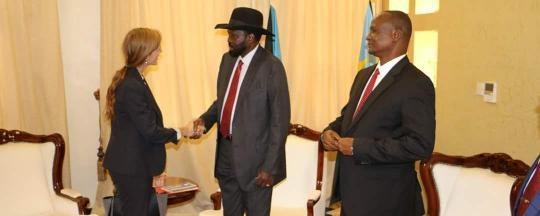The United States says that it will introduce a resolution at the United Nations Security Council to impose an arms embargo on South Sudan and targeted sanctions on individuals who have been spoilers of peace.
It is a significant statement by the United States government that signals South Sudan’s growing international isolation, and could increase tension between the Obama administration and President Salva Kiir.
“This constitutes an important step toward curbing the ongoing violence perpetrated by government and opposition forces against civilians,” said U.S. ambassador to the U.N. Samantha Power at a meeting on South Sudan at the Security Council. “As we’ve learned elsewhere, an arms embargo is effective if there is a broad and robust commitment to its enforcement. Imposing new targeted sanctions designations will isolate the individuals who have consistently been responsible for the acts that have brought South Sudan to this moment, and which have caused so much suffering.
The proposal is a significant step for the United States, who have frequently threatened, but opposed actually placing an arms embargo on South Sudan since civil war broke out in 2013.
South Sudan’s deputy ambassador Joseph Moum Malok said that an arms embargo would only effect legitimate weapons that the government acquires, and would not effect rebel acquisitions, thereby unfairly hindering the SPLA.
But at the Security Council, the proposal is likely to face opposition from the Russian government. At the same meeting, Russian deputy U.N. ambassador Petr Iliichev said that an arms embargo wouldn’t be helpful, and targeted sanctions “would be the height of irresponsibility now,”
Power said that the embargo would not be a panacea. She said that an embargo on South Sudan would not completely stop weapons from getting into the country, and it wouldn’t have remove the weapons already in the country.
But an arms embargo could have a significant impact on the ground, particularly on preventing the acquisition – which occurs daily; as we sit here, more arms are flowing into that country – the acquisition of heavy weapons, aircraft, and military vehicles, which have been used to inflict such devastating violence in this conflict – which were used, in fact, in the conflict in Juba in July.




